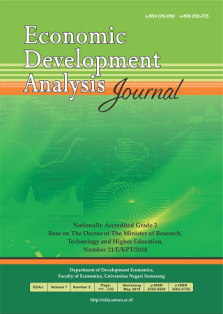Impact of Education on Poverty and Health : Evidence from Indonesia
Abstract
As a classical problem, governments in developing countries should pay more attention to poverty, its determiners, and its impact. Based on several previous studies, there is a strong relationship between poverty, education, and health status. This study aims to scrutinize the relationship between education, health, and poverty and the way they affect each other to make the priority scale in efforts to reduce poverty. Therefore, to measure the relationship between them, monetary and non-monetary models are used. By using 2SLS regression for monetary models and logistic regression for non-monetary models, it is found that education significantly affects the wealth status of household and health. In disaggregated form, the return from tertiary education have significantly higher than the return from primary and secondary levels. Other control variables such as age, gender, number of children, and residential, also have significant impacts on poverty and household health status. Based on those results, the government should enhance and intensify several programs such Program Indonesia Pintar (PIP), Bidikmisi, inclusive work environment, wage equality, PKK, and GERMAS to eradicate poverty and elevate the public’s health status through education and other supporting factors.


